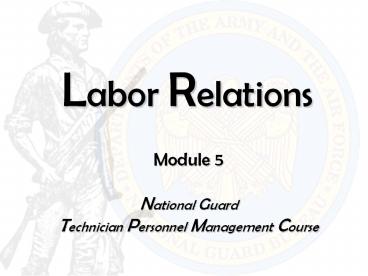Labor Relations - PowerPoint PPT Presentation
Title:
Labor Relations
Description:
Arial Berlin Sans FB Times New Roman Default Design ClipArt Microsoft Graph Chart Labor Relations BARGAINING UNIT EXCLUSIONS 5 USC 7112 DEFINITION OF A ... – PowerPoint PPT presentation
Number of Views:768
Avg rating:3.0/5.0
Title: Labor Relations
1
Labor Relations
- Module 5
- National Guard
- Technician Personnel Management Course
2
BARGAINING UNIT EXCLUSIONS5 USC 7112
- Supervisory/Management Officials
- Personnelists (non-clerical)
- Assistants to general labor relations policy
officials - Employees engaged in work affecting national
security - Employees who perform agency investigative or
audit activities - Professional employees in a mixed pro/non-pro unit
3
DEFINITION OF A SUPERVISOR
- IAW 5 USC 7103 A supervisor is a person who is
authorized, with respect to employees, to do or
recommend at least one of the following - -hire -promote -direct employees
- -transfer -furlough -suspend
- -assign -remove -reward
- -recall -lay-off -adjust grievances
- -discipline
4
DUTY TO BARGAIN
- Personnel Policies
- Merit Promotion/Hiring Reduction In Force
(RIF)/Furlough Procedures - Personnel Practices Working Conditions
- Parking assignments picnics employee lockers
location of coffee makers and microwave ovens
office space/design type and placement of office
furniture, etc
5
NON-NEGOTIABLE MANAGEMENT RIGHTS5 USC 7106
- Determine mission, budget, organization, employee
numbers and internal security - Hire, direct, lay-off and retain employees
- Suspend, remove, reduce (grade/pay) or discipline
employees
6
NON-NEGOTIABLE MANAGEMENT RIGHTS5 USC 7106
- Assign work, contract out and determine which
personnel will perform operations - Select and appoint employees
- Take necessary emergency actions
7
NEGOTIATED GRIEVANCE PROCEDURES
- Coverage
- All employee grievances except those excluded by
5 USC 712 (b) (c) (no strike/work stoppage
provisions) and/or 32 USC 709 (NG Technician Act
provisions) - Must provide for final and binding arbitration
- Must provide for binding arbitration
8
NEGOTIATED GRIEVANCE PROCEDURES
- Coverage (continued)
- Generally -
- Limits employees to either union or self
representation - Does NOT apply to people excluded from the
bargaining unit
9
UNFAIR LABOR PRACTICESunder 5 USC 7116(a)
- Interference, restraint or coercion of an
employee in the exercise of assured rights - Encourage or discourage membership in a labor
organization by discrimination with respect to
conditions of employment - Sponsor, control or otherwise assist a labor
organization
10
UNFAIR LABOR PRACTICES
- Discipline or discriminate against an employee
because he/she has filed a complaint or given
testimony under 5 USC 7116 - Refuse to consult/negotiate
- Fail to cooperate in impasse procedures
- Enforce rules or regulations in conflict with a
prior collective bargaining agreement
11
HANDOUT
12
ALTERNATIVE DISPUTE RESOLUTION (ADR)
- Types of Mechanism
- Joint Dispute Resolution Committees
- Internal Agency Third-Party Review
- Facilitation
- Mediation
13
ALTERNATIVE DISPUTE RESOLUTION (ADR)
- Types of Mechanisms (continued)
- Fact-finding
- Advisory Arbitration
- Mediation Arbitration
- Interest-Based (win-win) Bargaining
14
ADR MECHANISM COVERAGE
- Grievances
- EEO cases/issues
- Hearing examiner cases
- Workplace problems
- ANY issue the parties agree to place under ADR
- ULP cases
- Contract interpretation disputes
- Bargaining disputes
15
WHY USE ADR MECHANISM?
- Decrease litigation/ resolution costs
(money/time/man-power) - Increase consensual settlements
- Improve relationships
16
WHY USE ADR MECHANISM?
- Decrease formality
- Limit adversarial opportunities
- Facilitate future problem resolution
17
WHAT IS A FORMAL DISCUSSION?Under 5 USC 7114
- A discussion which is
- formal in nature,
- between one or more representatives of the agency
AND one or more bargaining unit employees or
representative, AND - related to any grievance or any personnel policy
or practices or other general conditions of
employment
18
MANAGEMENT OBLIGATIONS
- Notify the appropriate union representative of
the meeting - Afford union the opportunity to select its
representative and to attend - Allow the union representative to actively
participate at the meeting
19
THERE IS NO FORMAL DISCUSSION WHEN/IF
- Discussion is about and with an individual
employee related to his/her - Personal problems
- Job performance
- Performance evaluation
- Oral reply to proposed disciplinary action(s)
- During impromptu meetings on the shop floor
20
INVESTIGATING INTERVIEWS
THE WEINGARTEN RIGHT (5 USC 7114)
21
UNION RIGHTS WHEN GRANTED EXCLUSIVE RECOGNITION5
USC 7114
- May negotiate agreements for all employees in the
collective bargaining unit - Responsible for representing the interests of all
bargaining unit employees member or NOT - Must be given the opportunity to be represented
at all formal management-employee discussion
concerning grievances or other negotiable issues
22
UNION RIGHTS WHEN GRANTED EXCLUSIVE RECOGNITION
- Must be given the opportunity to be present at
any investigative examination of a unit employee,
IF the employee - Reasonably believes the examination may result in
disciplinary action, - AND
- Requests representation
23
USE OF OFFICIAL TIME
- 5 USC 7131 provides that internal union business
shall be conducted during the non-duty hours of
the employees concerned - MUST approve for Collective Bargaining
- FLRA Proceedings
- MAY approve for Other representational
activities - MAY NOT approve for Internal union
business
24
PAST PRACTICE
- Once the parties establish a practice it becomes
a condition of employment and must be bargained - You do not have to bargain over the decision to
change a practice which conflicts with law or a
government-wide regulations (5 USC 7117) - Management is not free of the obligation to
provide the union with advance notice of its
intent to change what has been a condition of
employment - Management must also bargain on demand on
bargain- able proposals which come back
25
HANDOUT
26
Questions































